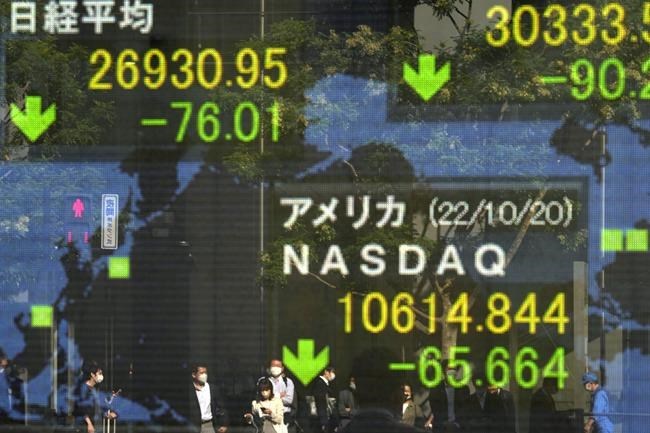TORONTO — Some of the shine has come off sustainable investing this year amid questions abouteffectiveness and as oil and gas prices and stocks spiked while the wider market floundered, but those in the sector say it still makes sense for the long term.
The investment category, which aims to encourage better corporate performance on environmental, social and governance (ESG) measures through more selective stock picks, saw huge growth during the wider market gains in the past couple of years, growing from about $10 billion in Canadian assets in early 2020 to almost $35 billion at last count.
That growth has almost grounded to a halt, with asset inflows of $243 million in the third quarter down by 85 per cent from the second quarter's $1.68 billion according to the latest data from Morningstar.
New sustainable product launches have also slowed to a trickle, with five new mutual funds and no ETF launches in the third quarter, compared with 28 in the first quarter and 13 in the second.
The pullback comes as part of a wider retreat from investing as economic worries mount, but it has been more pronounced, said Abdulai Mohamed, manager research analyst at Morningstar.
"Definitely the pullback from ESG investing has been larger than non-ESG funds broadly.”
Investors in the space are, however, still benefiting from all the previous product launches and inflows of cash that boosted competition in the space and helped erode the premiums once associated with the sector.
Mohamed's latest research has found that while self-directed ESG stock investing still runs an average fee premium of about a tenth of a percentage point, it can be cheaper on the commission-based and fee-based side, especially in fixed income and when investing in a combination of fixed and equity options.
“Investing in ESG, not as expensive as you would think," said Mohamed.
The wide range of ESG options makes for differing assessments of how the sector performs compared with the wider market, but Morningstar’s report found that 64 per cent of sustainable equity funds and 63 per cent of combination equity and fixed income funds outperformed their respective Morningstar categories, while 66 per cent of fixed-income funds underperformed.
The performance of ESG funds lately have depended in part on how restrictive they are, with ones that still held oil and gas stocks closer aligned to wider indexes, said Tim Nash, founder of Good Investing.
“Most ESG funds in Canada still contain fossil fuels. Those are the ones that are designed to track that benchmark, that kind of standard index more closely."
While most sustainable funds try to select the best performers in each sector, ESG funds that are even more restrictive to exclude some sectors entirely have had a bit of a tougher run, said Nash.
“Depending on how far you want to go on this sort of crunchy granola side of the sustainability spectrum, then you were signing up for more volatility or a higher tracking error.”
He said clients haven’t raised much concern so far about the performance on the ESG side relative to the market as a whole.
“The thesis for ESG investing was never, 'Get rich quickly, you're going to outperform dramatically.' The thesis has always been that we're trying to track the overall benchmark, and do it in a way that's more in line with your values.”
The strategy has made it easier for his clients to hold for the long term and ride out market turbulence, said Nash.
“When investments are aligned with your values, and you feel good about your investment, I think it just makes it really so much easier to stick to that plan.”
Long-term investment strategies are key, said Patti Dolan, portfolio manager at Wellington-Altus Private Wealth Inc., who’s been in the responsible investing space since the mid-'90s.
“The markets, the way they are currently, 'this too shall pass,' so we always do look at the long term.”
She said that the pullback in the market is a tremendous opportunity to dollar-cost average, meaning buying investments at currently lower valuations to balance out the average cost of acquiring them.
While there are many new ESG options out there, Dolan said she prefers funds with a track record that show their alignment to their goals, so she suggests looking for more established options.
She also said that while there might be buying opportunities out there, it’s also good to review one's financial position more generally.
“I recommend folks review their risk tolerance; at this point in time to not make knee-jerk reactions into the market, but look longer term and make appropriate adjustments down the road.”
While she said the companies she invests in have excellent ESG policies, so they tend to be more resilient, Dolan said it’s also still good to make sure that people are setting aside enough liquid investments to ride out dips in the market — especially for retirees or people close to retirement.
“It's really important to make sure that there's adequate funds available, that you don't have to sell into the markets when you don't want to.”
And while ESG continues to evolve and work through flaws, the underlying principle still stands, said Mohamed.
“Investing in ESG is not only for performance, it is for both obviously having a good return, and also for the greater good of society and the environment, so we are advocates of that, advising people to continue to stick around.”
This report by The Canadian Press was first published Oct. 26, 2022.
Ian Bickis, The Canadian Press



